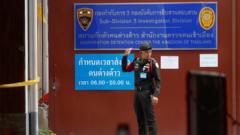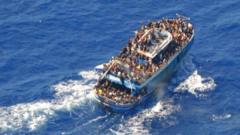The Decápolis Hotel in Panama City has become a holding facility for deported migrants, where they express desperation amid tight security measures. With many fearing for their safety if returned to their countries, their fate remains uncertain as international organizations get involved.
"Desperate Pleas from Deportees: Migrants Held in Panama Hotel Await Fate"

"Desperate Pleas from Deportees: Migrants Held in Panama Hotel Await Fate"
Hundreds of undocumented migrants deported from the U.S. are being held in a luxury hotel in Panama, raising concerns over their treatment and future.
In a troubling scene at the upscale Decápolis Hotel in Panama City, 299 undocumented migrants, recently deported from the United States, have found themselves in what they are calling a "temporary custody" center. This comes after the Panamanian government took in these individuals, mainly from countries like India, China, and Iran, following an agreement to serve as a transit point for deportees.
Inside the hotel, the conditions have ignited significant concern. Migrants are using handwritten notes displayed from windows to plead for assistance, with messages including "Please help us" and “We are not safe in our country." Many have resorted to desperate gestures to signal their plight, including crossing their arms to signify captivity. Heavily armed security enforces strict control over the facility, reinforcing fears of their uncertain futures.
As the situation unfolds, reports indicate that while 171 of these migrants are willing to return home, others remain adamant about not going back due to the risks they face. They brace for potential transfer to a migrant camp in Darién, a location known for serving as a rest point for those attempting to reach the U.S.
Communication with the outside is severely restricted, as the Panamanian government tightens security and cuts off internet access. An Iranian woman who has lived in Panama for years has been trying to help those in the hotel, revealing they have been denied legal representation and are confined to their rooms.
Panama’s Minister of Public Security, Frank Ábrego, stated that the authorities must protect citizens and discussed the complexities of negotiating the return of these migrants to their home countries—countries that may refuse their repatriation. The International Organization for Migration (IOM) has stepped in to assist, promising to respect the dignity and rights of those affected while facilitating safe returns or alternative solutions.
Conversations are ongoing about the possible arrival of more deportees in the region, particularly with Costa Rica also expected to take on a similar role as Panama. Academic experts caution that Panama’s role may lead to strained diplomatic negotiations with various nations reluctant to take back their nationals. As the migrants await their fate, the situation shines a light on the broader implications of deportation policies and the human consequences for those caught in this complex web of immigration enforcement.






















